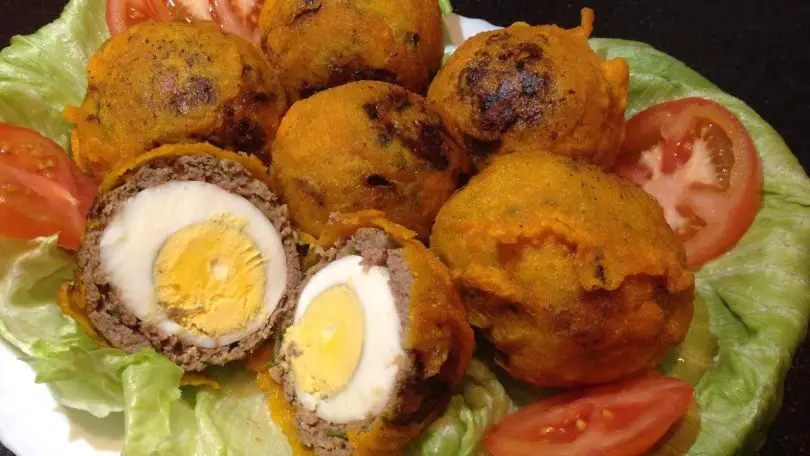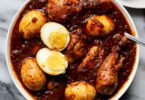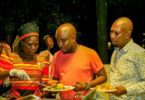Muslims have been observing the Holy month of Ramadan for the past few days. And traditional African Food for Ramadan are now a phenomenon.
Ramadan dictates that there is no drinking or eating once the sun rises. They only break the fast after dusk with healthy meals. Suhoor and Iftaar are the Muslims’ early morning and evening meals, respectively.
Food plays a big role with special traditional dishes, and drinks served. During Ramadan, different cultures in Africa have different foods they eat. However, there are a few Ramadan traditional foods that have become staples across Africa. Below is an assortment of delicious African traditional dishes to enjoy during Ramadan.
Table of Contents
Water, Milk, and Dates

Dates. Photo/Healthline
Traditionally, the Ramadan fast is broken with dates in adherence to the teachings of the Prophet Mohammed, who also broke his fast this way. This intensely sweet fruit is high in fibre, potassium, magnesium, and vitamin B-6. You may serve dates stuffed with nuts or even rolled with coconut.
Most African countries such as Tanzania, Tunisia, and Morocco cuisine start their iftar meal by eating dates and drinking milk. Tanzania includes dates for their breakfast alongside sweetened water.
Couscous

Couscous [Photo: Once Upon A Chef]
Algerians also love to eat “mousouf”, a dried couscous with raisins and yogurt during Ramadan.
Okra Stew
Sudan is known for its delicious soups and stew. One of their most popular stews for Ramadan is Okra stew, with lamb meat and a range of spices. The Sudanese love eating the stew with either chapati, rice, or both. Okra stew is also high in protein, making it the perfect meal for Ramadan.
Boeber
Boeber dish is popular in Cape Town, South Africa, traditionally served on the 15th night of Ramadan to celebrate the middle of the fast. The South African pudding has evolved into a classic Cape Malay sweet milk drink made with vermicelli, sago, sugar, and flavors such as cardamom, cinnamon and rose water.
Nafaqo
Nafaqo is a Somali word meaning “nutrition”. Nafaqo is egged stuffed potatoes cooked using special techniques to achieve a unique appearance. This Somali appetizer butters you up for the main course! Depending on the area, some Somalis use ground beef in the place of potatoes.
Fata
Do you like crispy bread? What about rice and meat? The Egyptians have you covered for Ramadan. Egyptians combine crispy bread, rice, and meat to create a layered dish of taste bud paradise. With the crispy bread as the foundation, followed by a middle layer of Rice, and a top layer of meat and sauce, Fata is a must for Ramadan.
Samosa and Chapati

Samosa is one of the popular street foods in Kenya. Photo/NDTVfood
Everyone is bound to have heard of or tried a samosa or chapati in their lifetime. samosa is irresistible when combined with its sweet and spicy chutney dip.
Chapati, prepared from wheat and oil, is also a popular dish in East Africa enjoyed by both Muslims and non-Muslims. You can eat it in both Suhoor and Iftar during Ramadan. Is it even an iftar without samosas or a chapati?
Ayam Masak Merah
Ayam Masak Merah translates to “red-cooked chicken”. Although it looks a lot like Chicken Curry, Ayam Masak Merah is very different in flavor and texture. It’s a fantastic dish that’ll surely keep you coming back for seconds! Popular in Malaysia, they serve only this traditional food on Eid or for iftars when there are guests!
Ingera
Injera is an Ethiopian and Eritrean traditional dish for Ramadan. Injera has several other dishes within it therefore, there are different sauces and dips to select ranging from beef to spinach. Very perfect for Ramadan, wouldn’t you agree?
Rice-based Dishes

Classic Cameroonian Jollof Rice served with chicken drum sticks [Photo by Wazobia African Market]
Biryani is a type of fluffy rice cooked with meat, potatoes, boiled eggs, chicken, and spices. pilau and biryani foods are the pride of the East African coastline and are common for Iftar.
Stuffed Vegetables and Soups
Soups and stuffed vegetables are essential components of Ramadan meals. Chicken, lentil, and tomato soups are some of the common soups served. To make stuffed vegetables, stuff peppers, eggplants, tomatoes, zucchinis, and vine leaves with flavored rice. This meal is famous in Egypt.
Beans

Beans. Photo/Taste of home
Beans are another African traditional food rich in nutrients such as proteins. Because of the nutrients, beans keep you full for long periods. You can eat beans with chapati or potatoes for Iftaar.
Fresh Fruit Salad
Hydrating, sweet, and satisfying, fresh fruit salad is a must at any Ramadan table. Fresh fruit is a great source of vitamins and can be enjoyed during suhoor or evening iftar.
Haleem
Haleem is a nutritious packed thick barley broth containing meat, wheat, lentils, and spices cooked over low heat. You can enhance the spiciness and flavour with a squeeze of lemon just before serving the soup.
Atayef
Originally famous in Egypt and the Levant, they usually fill these Arabic pancakes with cheese or nuts and serve them with sugary syrup or honey.
Luqaimat
Luqaimat is small, sweet dumplings made from butter, sugar, milk and flour. Luqaimat is a common Ramadan meal in Zalabia in Egypt.
Black Coffee and Tea
The enjoyment of coffee during Ramadan may stem from more than just good flavor. Black coffee has some surprising benefits during Ramadan. it is a source of antioxidants and will keep you hydrated as well. During Ramadan, Kenyans and Eritreans enjoy roasted coffee, and tea grilled with ginger and cardamom.








